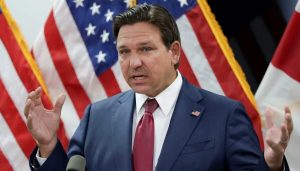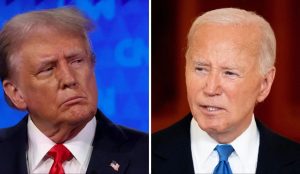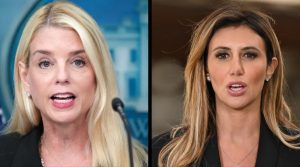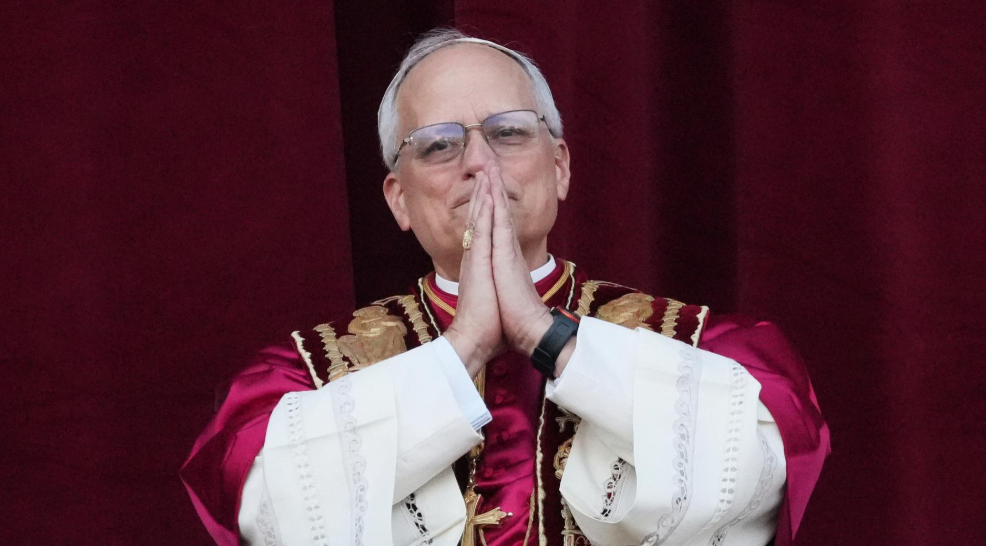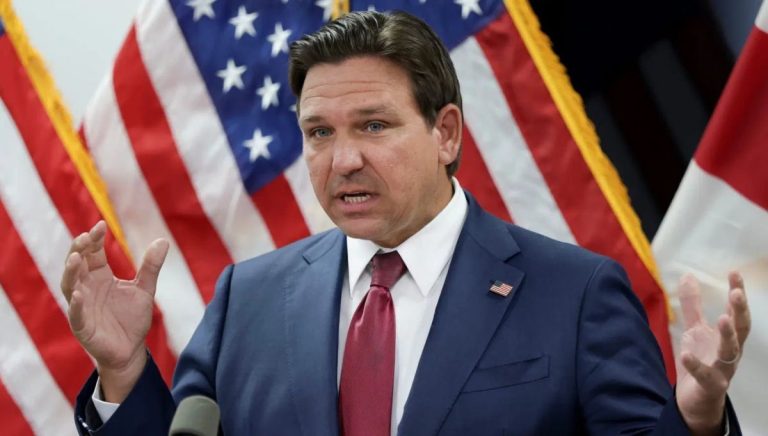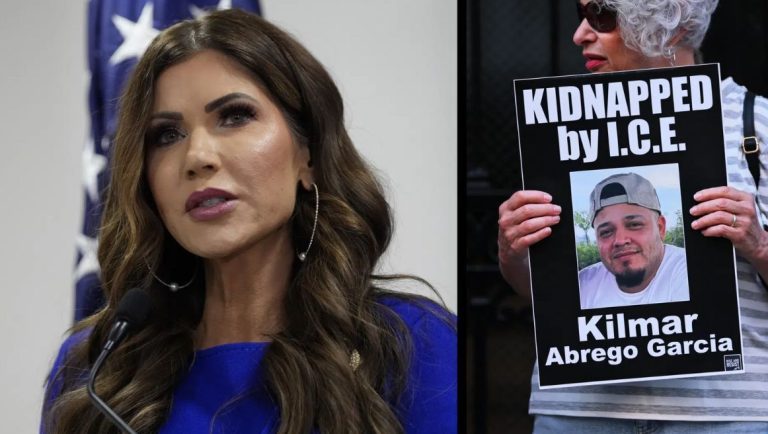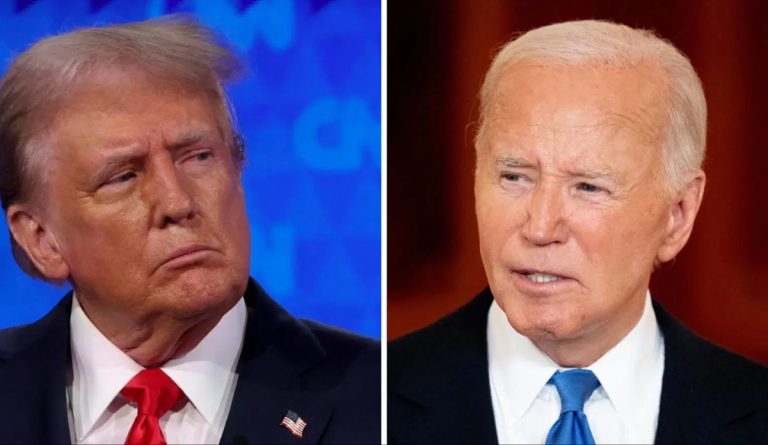NOTE:VIDEO AT THE END OF ARTICLE.
Pope Leo XIV’s One-Word Message to the United States Sparks Global Debate: What It Really Means
Pope Leo XIV, the newly ascended pontiff of the Catholic Church, is already making headlines worldwide, despite having only recently begun his papacy. Born in Chicago and raised in the United States, the 69-year-old pope’s brief but poignant interactions have garnered intense scrutiny and discussion. His latest viral moment, which followed a simple one-word answer to a question about the United States, has stirred significant conversation among the public, political analysts, and theologians alike.
The One-Word Response
During his first international press conference on May 12, Pope Leo XIV was walking through the Vatican’s corridors, surrounded by crowds and journalists eager for his remarks. A reporter from the United States asked a direct, yet simple question:
“Do you have a message for the United States?”
Without missing a beat, Pope Leo paused for a moment, a small but knowing smile playing at the corners of his lips, and then delivered his one-word response:
“Many.”
There was a brief pause before he added, “God bless you all.”
It may seem like a subtle moment, but it quickly exploded on social media and news platforms worldwide. The response was cryptic yet unmistakably powerful. The brevity of the reply left much to be interpreted, with people from different walks of life offering their own interpretations of what the Pope’s words really meant. Was it a coded political statement? A subtle critique of US policies? Or a simple message of goodwill wrapped in brevity?
The World Reacts
Given the Pope’s high profile, every word he speaks is carefully analyzed and dissected. The internet’s reaction was swift and varied. Some saw his one-word response as cryptic, others as prophetic, while some interpreted it as menacing, a subtle warning veiled behind the Pope’s calm demeanor. It wasn’t long before opinions flooded social media, with users from around the globe offering their own interpretations.
To some, the Pope’s reply seemed like an indirect challenge to the political status quo in the United States, hinting at dissatisfaction with the current leadership and social issues. Others perceived it as a more general call for solidarity, urging Americans to come together in the face of global challenges. The ambiguity of the statement was part of its allure—it left room for every reader, listener, or viewer to draw their own conclusions.
But was the Pope’s comment actually a subtle critique of US politics, or was it something else entirely?
A Background of Criticism and Advocacy
Before he became Pope, Cardinal Robert Francis Prevost, known as Pope Leo XIV, was a vocal figure in Catholic circles, unafraid to speak his mind about political and social issues. As a cardinal, he had often used his platform to criticize aspects of US politics, especially when it came to issues such as immigration, social justice, and the treatment of marginalized groups.
As far back as 2015, Cardinal Prevost had publicly shared his concerns about the rhetoric of then-presidential candidate Donald Trump, particularly his views on immigration. Prevost reshared op-eds and articles that critiqued Trump’s divisive language, particularly around issues of immigration, labeling them as harmful and counterproductive. He was outspoken about the need for a more compassionate and just approach to the plight of refugees and migrants—a message that resonated deeply within the Catholic community.
Even before his election as Pope, his social media activity had focused on issues of justice, human dignity, and the moral responsibility of governments to protect the most vulnerable. He often reposted and amplified messages from Pope Francis, especially the late Pope’s condemnation of mass deportations and inhumane border policies. This shift in tone from Cardinal Prevost to Pope Leo XIV has not gone unnoticed, particularly given his rising profile on the international stage.
While he has not publicly named Donald Trump or other political figures directly since becoming Pope, it is evident that his stance on key issues remains clear. His call for justice, compassion, and protection of human dignity has only intensified since taking office, and his one-word response to the US question may be seen as a continuation of that advocacy.
Pope Leo XIV’s Stance on Immigration
Pope Leo XIV’s social media presence has already made waves with his outspoken critiques of US immigration policies. In April, he shared a tweet from a Catholic commentator criticizing US President Trump and El Salvador’s President Nayib Bukele for making light of the deportation of a Maryland resident, Kilmar Abrego Garcia. The tweet emphasized the importance of empathy in addressing the refugee crisis, urging leaders to focus on the humanity of migrants rather than treating them as political pawns.
His concern for the marginalized and his stance on immigration have remained central to his papacy. In addition to his social media reposts, Pope Leo XIV has continually raised awareness about the unjust treatment of immigrants and refugees, calling for a more compassionate and inclusive approach. His views on immigration are rooted in the idea that all human lives are of equal value, regardless of nationality or status.
Given his track record, it’s clear that Pope Leo XIV is not just an advocate for the Catholic faith but also for the marginalized and dispossessed. His social media activity and public statements indicate a willingness to challenge political rhetoric that dehumanizes immigrants or stokes division. His one-word response could very well have been a subtle but powerful message to those in the United States who advocate for policies that harm vulnerable populations.
A Political Neutrality?
One of the most intriguing aspects of Pope Leo XIV’s papacy is his reluctance to be firmly placed on any political spectrum. While he has been vocal in criticizing certain political figures, his stance is not limited to partisan divides. Pope Leo XIV has consistently expressed concern about the disillusionment of working-class voters and has warned that political parties must do more to connect with the everyday concerns of people.
In conversations with those close to him, it is clear that Pope Leo XIV believes the Church should remain politically active, but never as a partisan player. He has made it clear that his role is to speak for the average citizen, the worker, and the migrant, not to align himself with any political party or agenda. His papacy, like that of his predecessor, Pope Francis, emphasizes empathy, respect, and practical justice—values that transcend political divides.
His name, Leo XIV, is a nod to Pope Leo XIII, known as the “Pope of the Workers.” Pope Leo XIII was a strong advocate for workers’ rights, fair wages, and labor protections, and Pope Leo XIV seems to follow in his footsteps, advocating for a fairer, more just world. Yet, his calls for justice and fairness are not rooted in left-wing or right-wing ideologies; rather, they are based on timeless Catholic principles that seek to elevate human dignity above political conflict.
The Ambiguity of One Word
Was the Pope’s one-word response a subtle jab at US politics? Was it a call for greater solidarity, a plea for compassion and unity in the face of growing social divides? Or was it simply a diplomatic response that left more room for interpretation than any direct statement could have?
The beauty—and danger—of one-word responses is that they leave so much open to interpretation. Pope Leo XIV’s comment has left people guessing, trying to read between the lines. For some, it was an expression of frustration with US policies. For others, it was a call for cooperation and understanding across political lines. Still, for many, it felt like the Pope was sending a warning, a subtle but unmistakable message about the current state of affairs in the United States.
Given the nature of his papacy so far, it is clear that Pope Leo XIV is not one to shy away from making bold statements, even if they come in the form of a single word. As his papacy continues to unfold, the world will undoubtedly be watching closely, eager to see what he says—and what he does next.
A Global Audience
What makes Pope Leo XIV’s stance particularly noteworthy is the global attention it has garnered. While his one-word message may have been directed at the United States, the implications of his words reach far beyond American borders. The Catholic Church, with over 1.3 billion followers worldwide, has a unique platform to influence not only religious discourse but also global politics. Pope Leo XIV, like his predecessors, understands the weight of this responsibility and appears willing to use his influence to challenge policies he believes are unjust.
As his papacy progresses, the world will continue to scrutinize his every word and action. Will he remain a voice of reason and compassion, calling for unity and empathy in the face of division? Or will his words become a rallying cry for those seeking a more just and equitable world?
One thing is certain: Pope Leo XIV may speak softly, but his words resonate loudly.
